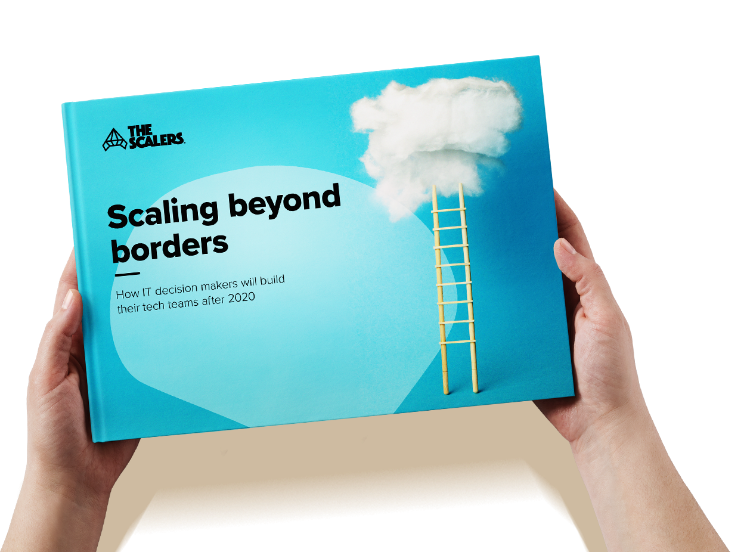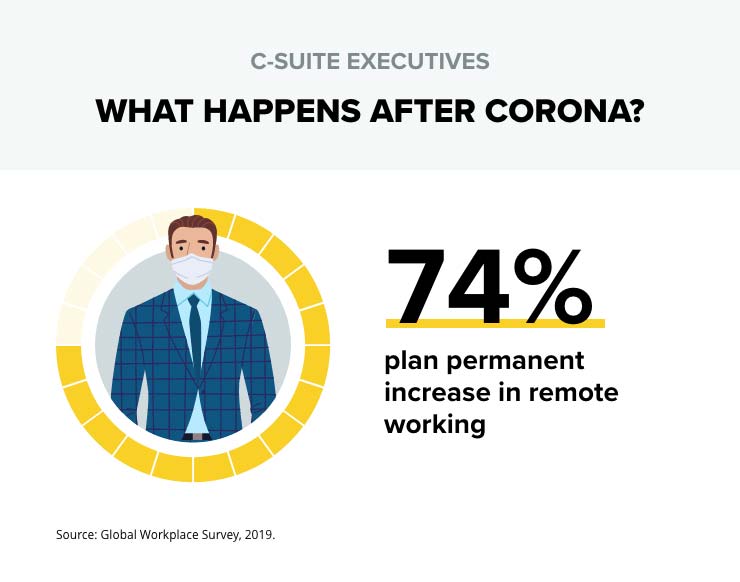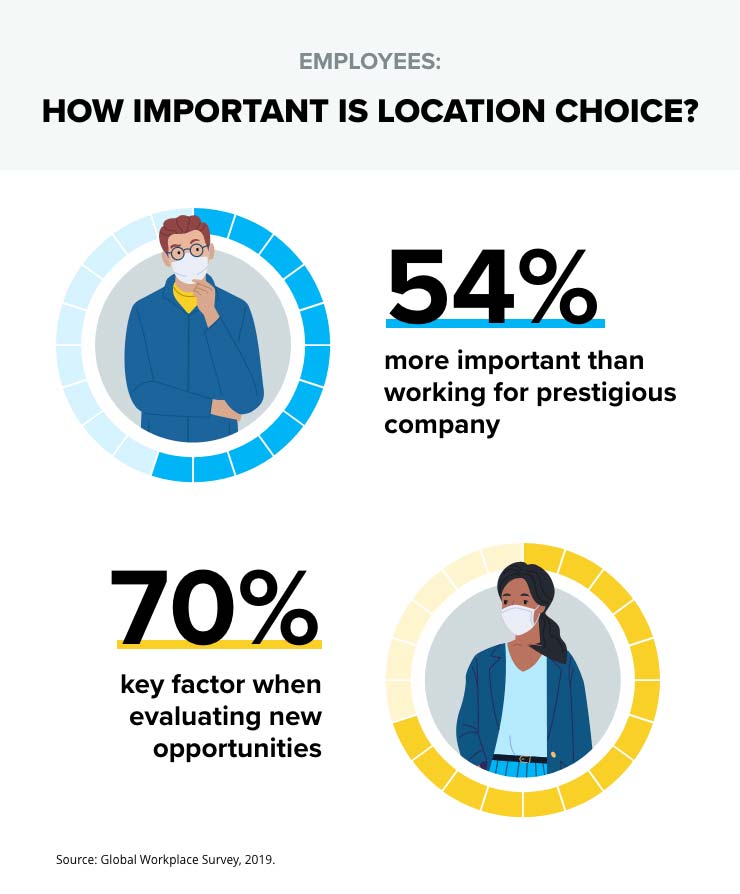COVID-19 has changed how businesses operate. With almost every organisation globally imposing a mandatory work-from-home policy, there has been a sudden, overnight, and en masse switch to remote digital work, like never before.
Does this abrupt move have the potential to change how remote work is perceived? What does this mean for businesses? Will COVID-19 prove to be the tipping point in the future of remote teams? Let’s find out.
Remote Work Before COVID-19
The Global Workplace Survey 2019, defined “flexible working” as either working from a different city/country, working from home, or working with no fixed hours. Over 75% of the respondents of the survey considered flexible working as the “new normal.”
Over the last decade alone, remote work in the US has grown by over 91%. And there are significant advantages to this. For instance, according to CoSo Cloud, 77% of remote employees say they’re more productive when working from home. A survey by Atlassian showed that 76% of the respondents prefer to avoid their office completely when they need to concentrate on a project.
This clearly proves that remote work has grown steadily, and for good reason, as companies of all types — private, public, nonprofit, or startup — continue to recognise the bottom-line benefits of integrating remote teams into their business strategies.
Leading up to COVID-19, these measures showed great promise in changing how we work, and at a pace where the transition would be seamless, uncoerced, and beneficial to all. However, today, we are an unwitting part of the world’s largest remote work experiment.
Are Organisations Ready For This Change?
The abruptness of COVID-19 has left employers in somewhat of a pickle. Many of them must adjust with a lack of equipment and policies, insufficient broadband speeds, missing or inadequate software, lack of cybersecurity measures, and other elements that would require weeks or even months to plan.
And so, where many companies have gradually been testing the remote work waters to see if it can be a possibility for their organisations, they’ve suddenly been dealt with “It’s here. Can we make this sustainable?”
Will they fall back into the “old normal”?
On the one hand, we can optimistically say that remote work is here to stay. However, we still have to explore the possibility that new business trends may emerge, companies may fall back into old habits, and stay away from remote work post-COVID-19.
For instance, a small percentage of companies may shy away simply because they find the concept of handling a remote team overwhelming. Another reason can also be that ‘legacy’ industries such as accountancy just don’t have the infrastructure to handle this change, as compared to industries at the forefront of digitalisation (in particular new and disruptive entrants) that have flexibility built into their models, making the transition so much easier.

How IT decision makers will build their tech teams after 2020
DOWNLOAD GUIDEAlthough global businesses report that flexible working is now ‘the new normal’, providing workers with a truly productive and conducive workplace can be a complex task that requires organisations to evaluate every individual’s needs and their optimal set-up.
In an increasingly hybrid workspace environment where people typically work from a primary office location, home, and other flexible solutions such as business lounges, businesses must get the mix just right to ensure that flexible working is a boon and not a bane.

Embracing Remote Teams: A Possibility?
Let’s consider the ideal scenario where companies will realise that working with remote teams is no longer the scary bogeyman that is once was, leading to an increase in the global average of the number of companies that encourage flexibility.
This, in turn, can open up avenues such as offshoring, for instance. Since “geographical proximity” is no longer something that can’t be tackled, companies will probably build teams in other developing countries such as India. By doing so, they gain access to a massive talent pool, in turn, scaling their operations like never before.

Increase innovation and deliver at speed in the Silicon Valley of Asia
LEARN MOREWhat do companies have to say?
A study conducted by Gartner in April 2020, summarised what 317 CFOs thought about the concept of remote work. 74% of the CFOs surveyed said that they expect to move previously on-site employees remote post-COVID-19. They also highlighted how remote work might become the “new norm” as companies look to cut commercial real estate costs.
Similarly, in India, HR heads from leading corporations such as Axis Bank, RPG Group, EY, Cognizant, Deloitte, and Whirlpool, said that virtual workplaces are the future of work. Rajkamal Vempati, the VP of Axis Bank, was quoted saying, “Remote work is here to stay. Nearly 20-30% of people can work virtually going ahead.”


Over the last couple of weeks, companies have been in a fire-fighting mode to build the necessary IT backend infrastructure, which has been the most significant bottleneck so far in embracing a virtual workplace. Agreeing to this, Azfar Hussain, group head at RPG, said: “Any company that would have shied away from remote teams, would not have a problem now, especially with the IT infrastructure being put in place.”

What do employees have to say?
According to the Global Workspace Survey, 54% of the employees said that having the choice of a work location is more important than working for a prestigious company. 70% of the employees said that being able to choose their work environment is a key-factor while evaluating new career opportunities.

So it’s not just employers who are embracing the “new normal” during COVID-19. It’s employees too! Millennials being millennials, have invented new ways to make ‘remote collaboration’ less of a task and more of a fun activity.
For instance, there’s a new trend on social media, where teams hop on a video call for a “virtual happy hour,” which involves a drink or two, blowing off some steam, and catching up on each other’s tasks at the end of the day. There’s also something called “Zoom Bombing,” where uninvited guests make a special appearance on a zoom meeting. A crying baby, a dog licking your colleague’s face? It’s the new normal!
So while you’re sipping your tea and reading the monthly reports that just came in, all in the comfort of your home, consider this: What if you get to do this for the rest of your career? Will COVID-19 change how you work forever? Food for thought, eh?
Meanwhile, if you want to explore the possibility of building a remote development team in India, feel free to reach out to us by filling out the contact form. One of our senior executives will get back to you with a free consultation!
















